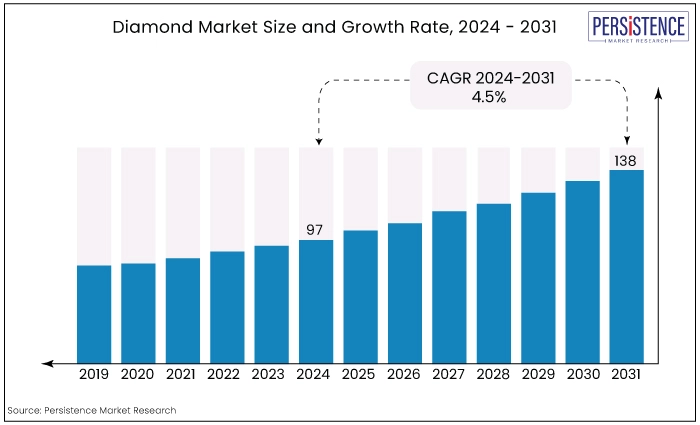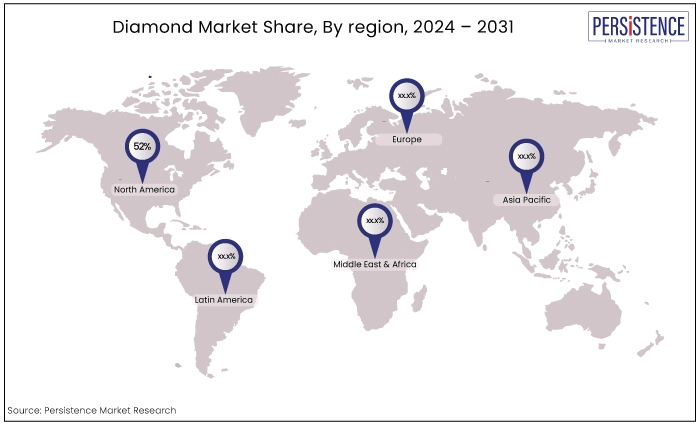ID: PMRREP34621| Upcoming | Format: PDF, Excel, PPT* | Chemicals and Materials

The market for diamond is estimated to reach a valuation of US$138 Bn by the year 2031, at a CAGR of 4.5%, during the forecast period 2024 to 2031.
Key Highlights of the Market
|
Attributes |
Key Insights |
|
Market Size (2024) |
US$97 Bn |
|
Market Size (2031) |
US$138 Bn |
|
Forecast Growth Rate (CAGR 2024 to 2031) |
4.5% |
|
Historical Growth Rate (CAGR 2019 to 2023) |
4.1% |
A diamond is an uncommon gemstone that is created through the application of immense pressure on carbon over millions of years. They are generated through the process of intense pressure and high temperature, originating from a depth of approximately 100 miles below the Earth's surface.
Moreover, they possess a hardness that is 58 times greater than any other substance discovered on Earth. It is a highly concentrated type of pure crystalline carbon that possesses the highest levels of hardness and thermal conductivity in the world.
Diamonds are utilized in several industrial applications, such as for polishing and cutting equipment. It is globally renowned for its exquisite beauty as a gemstone. Moreover, it is highly favored by consumers due to its reputation as the most esteemed adornment.
Diamonds are utilized in the production of highly sought-after jewelry for weddings and other significant events. The main factor driving market growth in revenue from rough varieties is the rise in production by smaller companies.

The market witnessed dynamic shifts and notable trends from 2019 to 2023, shaped by a combination of economic factors, consumer preferences, and industry dynamics. In 2019, the market was characterized by steady growth, buoyed by strong demand in key regions such as North America, Asia Pacific, and Europe.
Consumer confidence remained robust, supported by stable economic conditions in major markets and a growing appetite for luxury goods. The onset of the COVID-19 pandemic in early 2020 significantly disrupted the market.
Lockdowns, travel restrictions, and economic uncertainties led to a sharp decline in demand and disrupted supply chains. Mining operations were temporarily halted in some regions, impacting production levels.
By 2021, the diamond market showed signs of recovery as economies began to reopen and consumer confidence returned. Pent-up demand, particularly in bridal jewelry and high-end luxury segments, helped bolster sales. Online retail channels gained prominence as consumers adapted to digital shopping experiences.
Growing Jewelry Demand
Diamond, being the most rigid form of carbon, has been utilized in both jewelry and industrial sectors for numerous millennia.
The global diamond market expansion is linked to the product's advantageous characteristics, as it possesses the highest heat conductivity among all natural materials. These qualities make it suitable for use in sectors like polishing and cutting.
The diamond products have experienced a rise in usage within the construction industry in recent years. This is due to its high demand for hand sawing, wire sawing, and core drilling, which is attributed to its exceptional qualities such as the maximum sound velocity, optical dispersion, and low thermal expansion coefficient.
Moreover, the utilization of this stone for decorative purposes will significantly increase the demand for the goods.
Furthermore, the increasing demand for lab-grown diamonds is driving growth in the jewelry market, as these stones possess equal physical, chemical, and visual properties to naturally mined varieties. Therefore, people are shifting their preference towards artificial jewelry.
Increased Industrial Use
Diamonds are extensively utilized in the abrasive sector because of their exceptional hardness, which ranks at ten on the Mohs scale. This use is responsible for the overwhelming utilization of diamonds in the industrial sector.
The production process of saw blades, drill bits, and grinding wheels might result in the presence of small amounts. Subsequently, these tools are employed for the purpose of severing, perforating, or pulverizing inflexible substances.
The expansion of the construction industry is propelling the worldwide market for industrial diamonds. They are utilized in construction to cut, drill, polishing, and grinding. Industrial variants are used to cut materials such as glass, concrete, bricks, stones, coal balls, and ceramics.
High Price Segment
The diamond industry's growth may be hindered by increasing uncertainty in the prices of natural stones, notwithstanding their widespread use in industrial and jewelry applications.
The product's worth has experienced significant growth from the production stage to the retail stage. Furthermore, the cost of refined stone remains high in comparison to unprocessed stone.
The increased price is attributed to many variables such as currency volatility, limited manufacturing, and alterations in global import-export regulations.
These considerations have rendered this stone too expensive for many individuals, thereby impacting the purchasing ability of medium to lower-class individuals. Therefore, the reasons listed above are significantly impeding market growth.
Growing Demand for Lab-Based Diamonds
While lab-grown diamonds may not possess the same value as naturally mined variants, the market for these synthetic diamonds is gradually expanding. These jewels bear a resemblance to diamonds extracted from the soil in terms of their visual characteristics and chemical qualities, but they are produced in scientific laboratories.
According to a recent estimate by Edahn Golan, a renowned industry researcher, lab-based varieties accounted for around 17.3% of all sales of engagement rings. According to the same survey, this figure was approximately 1.7% three years ago.
Additional variables, such as increased utilization in the construction industry, may contribute positively to the global market. These substances are employed as cutting agents due to their ability to effortlessly cut through concrete materials.
Natural Diamonds Account for 90% Market Share
|
Market Segment by Product |
Market Value Share 2023 |
|
Natural |
90% |
Based on product type, the market is further classified into natural and synthetic, where the natural diamond segment dominates the market with 90% of the global diamond market share.
During the forecast period, the market was primarily led by the natural product category, which had the greatest revenue share. These items are exceptionally uncommon and are predominantly employed in the creation of jewelry.
Discovering and handling involve laborious procedures, rendering them expensive in the jewelry sector. Although lab-grown jewelry alternatives that are cheaper provide challenges, the inherent attractiveness of real diamonds continues to be robust and is expected to stay so in the future.
Synthetic diamonds are produced using high-pressure, high-temperature, and chemical vapor, and deposition (CVD) techniques. They are predominantly utilized in industrial environments for tasks like cutting and drilling.
Nevertheless, due to a substantial decrease in the manufacturing cost of synthetic jewelry, its market share has witnessed notable growth in recent years.
Jewelry to be the Primary Application Area
|
Market Segment by Application |
Market Value Share 2023 |
|
Jewelry |
95% |
Based on application, the global diamond market is further divided into jewelry and industrial applications, where the jewelry segment dominates the market share with almost 95% of the global market share.
The expansion of the middle-class demographic, in conjunction with the rising purchasing ability of millennials and Gen Z, are crucial elements that contribute to the expansion of the jewelry sector.
According to De Beers Group, millennials make up about 60% of the jewelry market in the US, while millennials in China account for 80% of the whole national demand for jewelry.
Millennials tend to allocate additional funds towards travel experiences rather than indulging in luxury goods. Diamond manufacturers and merchants are already contemplating the notion of incorporating a narrative into their marketing efforts that encompasses the entire journey of a diamond, from its extraction in the mine to its ultimate purchase by consumers.
North America Retains Dominance with 52% Market Share
|
Region |
Market Value Share 2023 |
|
North America |
52% |
North America dominated global market in 2023, capturing the highest portion of sales at 52%. The increasing need for synthetic diamonds in industrial applications is a significant factor driving their adoption in this region.
In the context of industrial use, the primary sectors encompass machinery production, construction, and mining services, specifically drilling and exploration for natural gas, oil, and minerals.
The primary utilization of synthetic variants for industrial purposes was in the construction of buildings, highways, stone cutting, and maintenance applications.
The increasing demand for synthetic varieties in industrial applications can be attributed to the precise fabrication of ceramic parts for the aerospace sector, laser radiation tools, and heat sinks in circuits.
Conversely, the Asia Pacific area is projected to experience the highest CAGR of 3.5% throughout the forecast period. The increasing prevalence of jewelry and adornments in emerging economies like China, and India is driving the demand in the region.
As a result, diamond market companies have chosen to augment their investments due to the expectation of robust sales in the coming years.
Industrial diamonds are widely employed in the construction sector for cutting concrete surfaces, polishing concrete floors, and other purposes in various types of equipment.
By 2032, the construction sector in India is projected to become one of the most rapidly expanding industries worldwide.
Market growth can be linked to the government of India's implementation of supportive policies aimed at strengthening urban infrastructure to fulfil the increasing demand for housing from the urban population.

July 2023
Burgundy Diamond Mines Limited signed an acquisition deal with Arctic Canadian Diamond Company (ACDC) to facilitate Burgundy Diamond Mines' vertical integration strategy throughout the value chain.
July 2023
De Beers Group and the Botswana government signed a partnership agreement to augment the quantity of unpolished stones supplied to the African nation.
May 2023
Blackstone Inc., one of the world's largest alternative asset management companies, signed an acquisition deal with the diamond grading firm International Gemological Institute (IGI) for US$535 million.
The market from 2023 to 2032 is poised for significant transformations driven by technological advancements, shifting consumer preferences, and evolving competitive dynamics.
Competitive strategies in the market from 2023 to 2032 will revolve around innovation, sustainability, and customer engagement. Leading companies are investing in research and development to enhance product quality and diversify their offerings.
Market leaders are also focusing on enhancing brand value through marketing campaigns that emphasize ethical sourcing, craftsmanship, and unique product differentiation.
The market is estimated to be valued at US$138 Bn by 2031-end.
North America is the leading region in the market.
The market is segmented based on product type, application and distribution channel.
Petra Diamonds Limited, Rio Tinto, Trans Hex Group, Lucara Diamond, and ALROSA are some of the major key companies in the market.
Jewelry segment is the dominant application segment.
|
Attributes |
Details |
|
Forecast Period |
2024 - 2031 |
|
Historical Data Available for |
2019 - 2023 |
|
Market Analysis |
US$ Billion for Value |
|
Key Regions Covered |
|
|
Key Companies Profiled |
|
|
Pricing |
Available upon request |
By Product
By Application
By Distribution Channel
By Region
Delivery Timelines
For more information on this report and its delivery timelines please get in touch with our sales team.
About Author